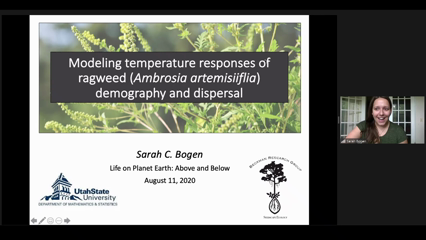MBI Videos
Sarah Bogen
-
 Sarah Bogen, Sarah BogenAs climate warms, populations may adapt by shifting poleward to track suitable habitat. The speed of such shifts is influenced by demographic characteristics, such as the species' survival and reproduction rates, and dispersal characteristics, such as the species' mean dispersal distance and dispersal kernel shape. Understanding how temperature influences demography and dispersal is important for understanding how a population will shift in response to climate change. Here, we present an approach for incorporating temperature into mechanistic models for population spread considering ragweed (Ambrosia artemisiiflia) as an empirical example. Ragweed is a strict annual with a long-lived seed bank that is of particular interest due to its roles as an allergen and a crop competitor. We propose a stage-structured integrodifference equation model with temperature-dependent demography and dispersal parameters. We assume that survival, growth, and reproduction respond to temperature according to a beta-distribution and that the dispersal kernel follows a Laplace distribution with a mean that increases with the size of reproductive adults. Future work will analyze the impact of a variety of temperature variation patterns on population spreading speed in order to assess ability to track suitable habitat under global change.
Sarah Bogen, Sarah BogenAs climate warms, populations may adapt by shifting poleward to track suitable habitat. The speed of such shifts is influenced by demographic characteristics, such as the species' survival and reproduction rates, and dispersal characteristics, such as the species' mean dispersal distance and dispersal kernel shape. Understanding how temperature influences demography and dispersal is important for understanding how a population will shift in response to climate change. Here, we present an approach for incorporating temperature into mechanistic models for population spread considering ragweed (Ambrosia artemisiiflia) as an empirical example. Ragweed is a strict annual with a long-lived seed bank that is of particular interest due to its roles as an allergen and a crop competitor. We propose a stage-structured integrodifference equation model with temperature-dependent demography and dispersal parameters. We assume that survival, growth, and reproduction respond to temperature according to a beta-distribution and that the dispersal kernel follows a Laplace distribution with a mean that increases with the size of reproductive adults. Future work will analyze the impact of a variety of temperature variation patterns on population spreading speed in order to assess ability to track suitable habitat under global change.
